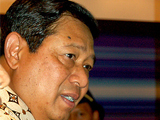Two Reminders From Indonesia
By Simon Roughneen for ISN
It is sometimes said that Indonesia is the most important country that the world knows least about. It might be cliché to remind that the country is “the world's largest Muslim-majority democracy,” but in truth the world's fourth-biggest country remains little-known relative to its size.
Earlier this week came two reminders why this knowledge deficit probably needs addressing.
On Monday, former Jemaah Islamiyah (JI) leader Abu Bakr Basyir was arrested for allegedly backing an al-Qaida-linked training camp in the country, with this coming after a series of terrorist-related shoot-outs and arrests in recent months.
Almost simultaneously, Jim O'Neill - the economist who coined the term BRICs to categorize the large emerging economies of Brazil, Russia, India and China - said that Indonesia, along with Turkey, would likely emerge next as a major global economic player.
Faring well
Southeast Asia's largest country has, like many other Asian countries, fared relatively well in the global downturn, posting growth of 4.5 percent in 2009 before year on year expansion at 6.5 percent so far this year.
G-20 member Indonesia and fellow Association for Southeast Asian Nations (ASEAN) member-states have established a separate free-trade areas with India and China over the past year, while hedging on a closer relationship with the US, whose President Barack Obama was raised on the 17,000 island archipelago.
Washington recently led a multilateral military training exercise in Cambodia, before mooting nuclear cooperation with Vietnam. In another signal that it wants to draw closer to Southeast Asian countries perhaps wary of a rising China, the US re-established links with Indonesia's special forces, Kopassus, long the target of human rights groups due to a violent, shadowy history in Aceh, East Timor and West Papua.
Basyir served jail time due to links to the 2002 Bali bombing and two of Southeast Asia's most-feared terrorists - Noordin Top and Dulmatin - were killed by Indonesian special forces during the past 12 months.
Basyir was caught in the dragnet after police claimed to have evidence that Jemaah Ansharut Tauhid (JAT), which he formed in 2008, was involved in a jihadist training camp in Aceh, an autonomous region in the northern end of the archipelago, which though having fought a partly sharia-based independence war against Jakarta, has not been known for links to transnational terrorist groups such as al-Qaida or JI.
Covert Islamisation?
Basyir says JAT is a legitimate group, but some see it as part of a drive to Islamize Indonesia, a country known for its syncretic blending of Islam with pre-existing religions and cults.
C Holland Taylor is Chairman and CEO of external pageLibForAllcall_made, which works to support moderate Muslims in Indonesia. He told ISN Security Watch that “what is most alarming is the infiltration of Indonesia's government by extremist Muslims who share the terrorists' ideology, if not their use of violence to overthrow the Indonesian state.”
Taylor says that Indonesia's security forces are aware of the link between radical ideology and terrorism, but that covert operators within the government and civil service work to stymie some reform efforts.
This type of latent or sleeper Islamisation in Indonesia is linked to the country's reform challenges. Indonesia's breakthroughs are notable given that some predicted a Balkan-style disintegration 10 years ago, and include not only a lively democracy and free press, but a concerted effort to thwart terrorism in the years after the Bali bombing in 2002.
With over 1,000 different ethnic groups, communal violence has declined, and electoral needs mean that cross-ethnic coalitions are needed for parties and candidates to succeed, right down to the local level.
The formerly dominant military has proved "willing to give democracy and the civilian leadership a chance," Sunny Tanuwidjaja of the Jakarta-based Centre for Strategic and International Studies, told ISN Security Watch. However, it is far from clear whether civilian control of the military is set for the long term.
Stalled reform
Certainly, challenges remain, and Indonesia's future orientation may depend on how far domestic reforms go.
Finance Minister Sri Mulyani Indrawati quit earlier this year after facing relentless opposition from former opposition-leader-turned-governing-coalition-partner Abu Bakrie. Her ministry had been investigating Bakrie's family businesses because they were suspected of evading hundreds of millions of dollars in taxes. Bakrie says he has not been involved in business since 2003, but worked to oust Sri Mulyani in any case.
Apparently angry that President Susilo Bambang Yudhoyono - aka SBY - failed to support her against Bakrie, she acidly described her departure as down to a “same sex” political marriage between SBY and Bakrie. In a country that was ranked as simultaneously the most corrupt and the most democratic in Southeast Asia in 2009, Sri Mulyani's tenure at the Finance Ministry saw more than 150 of its personnel dishonorably removed, with 2,000 more punished in some lesser form. She went after tax evaders, including some of Indonesia's elites.
This zeal made her unpopular, and not just with Bakrie.
A holdover from the Suharto era, Indonesia's untouchable super-rich comprise an oligarchy that transcends the rule of law and threatens to stall the country's progress. This has caught the eye of investors.
According to Jeffrey Winters, an academic at Northwestern University, and advisor to a recent Harvard University external pagestudycall_made - From Reformasi to Institutional Transformation: A Strategic Assessment of Indonesia’s Prospects for Growth, Equity and Democratic Governance - “unless oligarchs in Indonesia are forced to submit to impersonal laws that are stronger than they are, the country will remain corrupt, dominated by money politics, and unable to advance beyond resource extraction,” he said in an email to ISN Security Watch
India and China both need Indonesia's thermal coal and palm oil, two of the country's major exports amid a dearth of indigenous industry and top-class companies, and perhaps more important, the failure so far to set Indonesia up as a center for low-cost manufacturing. Arguably none of these sectors will emerge unless the country's regulations are amended and graft curbed.

